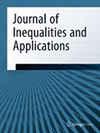关于带分数 q 衍生物的向混沌过渡的达芬型振荡微分方程
IF 1.5
3区 数学
Q1 MATHEMATICS
引用次数: 0
摘要
本文通过应用分数量子微积分,研究了一个具有三个连续分数 q 衍生物的非线性达芬方程。我们利用标准定点定理(Banach 定点定理和 Schaefer 定点定理)证明了存在性和唯一性结果。我们还讨论了上述 Duffing 问题的 Ulam-Hyers 和 Ulam-Hyers-Rassias 稳定性。最后,我们给出了一个示例和很好的应用;一个与我们的结果有关的达芬式振荡器方程。本文章由计算机程序翻译,如有差异,请以英文原文为准。
On a Duffing-type oscillator differential equation on the transition to chaos with fractional q-derivatives
In this paper, by applying fractional quantum calculus, we study a nonlinear Duffing-type equation with three sequential fractional q-derivatives. We prove the existence and uniqueness results by using standard fixed-point theorems (Banach and Schaefer fixed-point theorems). We also discuss the Ulam–Hyers and the Ulam–Hyers–Rassias stabilities of the mentioned Duffing problem. Finally, we present an illustrative example and nice application; a Duffing-type oscillator equation with regard to our outcomes.
求助全文
通过发布文献求助,成功后即可免费获取论文全文。
去求助
来源期刊
自引率
6.20%
发文量
136
期刊介绍:
The aim of this journal is to provide a multi-disciplinary forum of discussion in mathematics and its applications in which the essentiality of inequalities is highlighted. This Journal accepts high quality articles containing original research results and survey articles of exceptional merit. Subject matters should be strongly related to inequalities, such as, but not restricted to, the following: inequalities in analysis, inequalities in approximation theory, inequalities in combinatorics, inequalities in economics, inequalities in geometry, inequalities in mechanics, inequalities in optimization, inequalities in stochastic analysis and applications.

 求助内容:
求助内容: 应助结果提醒方式:
应助结果提醒方式:


